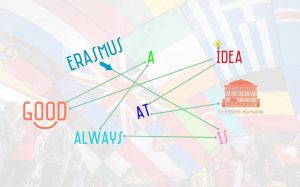University Politehnica of Bucharest has a tradition of more than 20 years in promoting the European dimension, encouraging students exchanges and cooperation between academic institutions in the participating countries. The Socrates programme was the beginning and it was implemented on the basis of Decision no. 819/95 / EC of the European Parliament and of the Council of Europe of 14 March 1995.
ERASMUS+ is the program by which the European Union supports education, training, youth and sport between 2014-2020, with the main features being: recognition and validation of skills and qualifications; dissemination and exploitation of project results; open access to the teaching materials, documents and media tools created within the programme; the international dimension (cooperation with partner countries in the field of higher education and sport); multilingualism; equity and inclusion; protection and safety of participants.
The structure of the ERASMUS + programme:
Key action 1: Learning mobility of individuals
Key action 2: Innovation and best practices
Key action 3: Support for policy reform.
TYPES OF ACTIVITIES
The following types of mobility are considered in the key action 1 (KA1) targeting academic institutions:
- Study mobility for students;
- Placement mobility for students (internships);
- Teaching mobility for teachers.
The Objectives of Learning Mobility:
- to help students benefit from educational, linguistic and cultural learning experience in other European countries;
- to promote cooperation between institutions and enrich the educational environment of host institutions;
- to contribute to the development of a joint body of qualified young people with open and international experience as future specialists;
- to facilitate the transfer of credits and the recognition of mobility periods spent abroad with the ECTS or other compatible credit system.
Placements (internships) for students (in enterprises, training centres, research centres and other organizations):
Placement is considered as a period of professional practice in an enterprise or organization in another country participating in the programme, aiming at training students to adapt to the requirements of the labour market by acquiring practical knowledge.
Host organizations for student placements can be enterprises, training centres, research centres, other types of professional organizations that must have a Participant Identification Code (PIC).
The characteristics of individual placements are:
- ensure full recognition by the home institution of the period spent abroad;
- signing an internship agreement on the programme of the placement; this contract must be approved by the home higher education institution and by the host organization;
- placement based on a contract approved by the home institution, the host organization and the beneficiary.
The objectives of teaching mobility for teachers at higher education Institutions
- to allow students who cannot participate in a mobility plan to benefit from the knowledge and expertise of academics from other European countries;
- to promote the exchange of expertise and experience in teaching methodology;
- to encourage universities to expand and enrich the content of the courses they offer.










